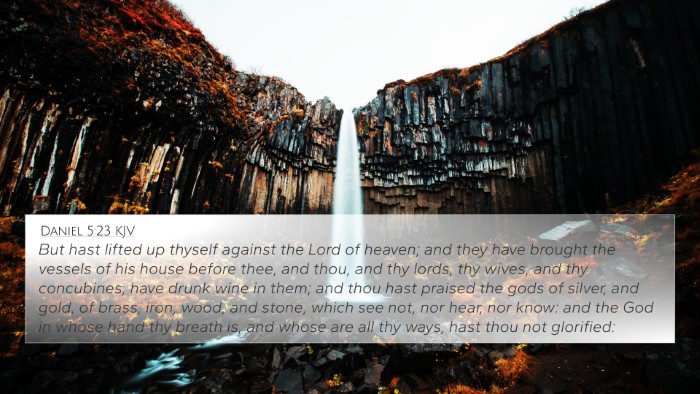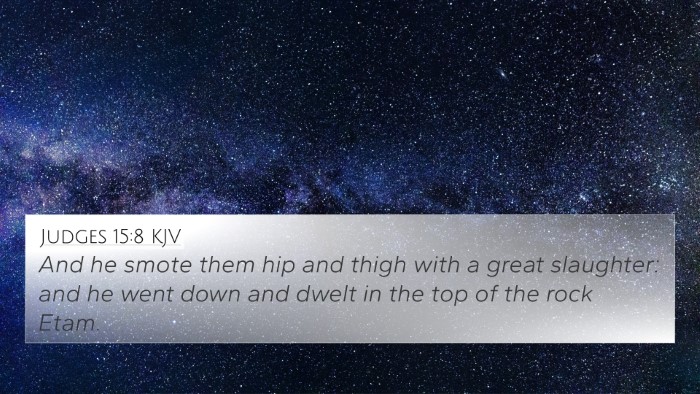Understanding Judges 16:24
Judges 16:24 states, "And when the people saw him, they praised their god: for they said, Our god hath delivered into our hands our enemy, and the destroyer of our country, which slew many of us." This verse occurs at a pivotal moment in the narrative of Samson, shedding light on themes of betrayal, defeat, and misguided worship.
Summary of Historical Context
This verse comes from the story of Samson, a judge of Israel, who had been captured by the Philistines after being betrayed by Delilah. Samson, once a mighty warrior, is now humiliated and displayed as a trophy of victory by the Philistines, leading to their worship of their god, Dagon. The verse captures the celebration of the Philistines as they attribute their success to their deity.
Commentary Insights
Various commentaries provide a deeper understanding of this verse:
- Matthew Henry: Henry emphasizes the irony of the Philistines' joyous declaration. They believed their god had granted them victory, yet this moment of apparent triumph ultimately leads to their downfall when Samson's strength returns. The mockery of God is evident, as He allows the Philistines to think they have conquered His servant.
- Albert Barnes: Barnes highlights the significance of the public spectacle. The entertainment value of Samson's humiliation illustrates the depravity of the Philistines and their ignorance of true power. He also connects this moment to the broader biblical theme of God's sovereignty, indicating that human pride often leads to its own defeat.
- Adam Clarke: Clarke notes the theological implications of this verse, pointing out that the Philistines’ arrogance blinds them to the reality of God's plans. He interprets their exclamation as a form of idolatry, where they attribute their victory not to their own strength but to a false god, missing the opportunity to acknowledge the true God.
Thematic Connections
This verse can be analyzed through various thematic lenses:
- Betrayal and Loss of Strength: Samson’s betrayal by Delilah parallels the theme of lost trust, not only in his relationships but also in God's plan for deliverance.
- Idolatry and False Worship: The celebration of the Philistines serves as a cautionary tale about the dangers of idolatry and the short-sighted nature of depending on false gods.
- God's Sovereignty: Despite Samson's failures and the temporary victory of the Philistines, God's ultimate plan unfolds through the weakness of His servant, showcasing that divine strength is made perfect in weakness.
Cross-References
Judges 16:24 connects with several other Bible verses, highlighting recurring themes of victory, betrayal, and divine providence:
- 1 Samuel 5:2-4: This passage narrates the capture of the Ark of the Covenant by the Philistines and their subsequent humiliation when Dagon falls before it.
- Psalm 115:4-8: This Psalm contrasts the true God with idols, echoing themes of false worship and the powerlessness of other gods.
- Isaiah 14:24-25: Isaiah speaks to the Lord's purposes against the Philistines, indicating His sovereignty over nations.
- Matthew 27:34: The mocking of Jesus during His trial resonates with the humiliation Samson faces, drawing parallels between both figures as victims of betrayal and ridicule.
- Luke 22:47-48: This passage recounts Judas's betrayal of Jesus, similarly themed with the betrayal Samson experiences.
- Hebrews 11:32-34: Samson is mentioned in the "hall of faith," highlighting how his story ultimately reflects God's mercy and purpose.
- Galatians 6:7: This verse reminds us that what we sow, we also reap, a principle evident in Samson's life as he faces the consequences of his choices.
Conclusion
Judges 16:24 serves as a profound reminder of the intersection between human failure and divine sovereignty. The public celebration of the Philistines juxtaposed with Samson's fall illustrates the complex interplay of faith, idolatry, and eventual redemption seen throughout the Bible.
As readers, we are encouraged to reflect on the deeper implications of our reliance on God versus the empty promises of worldly idols. The stories interwoven through scripture call on us to examine our own lives and the ultimate victory of faith over folly.













